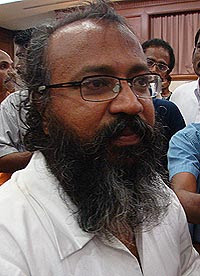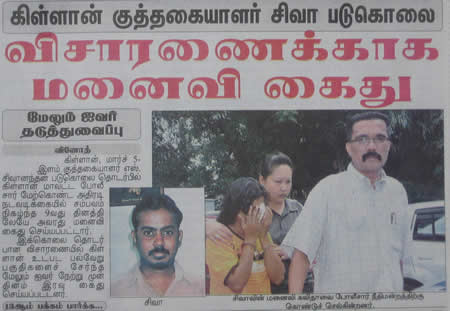
Actually, my case is very complicating indeed. The police report against me was that I was seditious because I had lied (di ada adakan). Therefore, should not the focus of my trial be on whether I did or did not lie? The government realises that this was a mistake so it is trying to amend the charge without officially amending it.
NO HOLDS BARRED
Raja Petra Kamarudin
I am currently on trial for the crime of sedition. It seems, according to Malaysia’s Sedition Act, I have committed a crime. The novel thing about the Sedition Act is that it does not matter whether I had lied or had told the truth. Even if I had not lied and had told the truth it would still tantamount to sedition. Therefore, I can go to jail for telling the truth if the government can prove that the truth I told is seditious. That is the fate that awaits me.
This means the court can block the truth from surfacing. I can’t use the truth as my defence. Therefore, I would not be allowed to adduce any evidence to support what I wrote or said. Never mind if I have evidence that so-and-so were the people behind the Altantuya murder or so-and-so were also present during the murder. This is not crucial to my defence and the court is not interested in seeing this evidence. The question would be: did I write or say what they allege I have written or said? If I did, then I am guilty. Whether I lied or not is not crucial to the charge and the court is not in the least interested in looking at whatever evidence I may have.
Now can you see why they chose to charge me under the Sedition Act as well as for criminal defamation for the second trial? This is so that the truth or falsity of what I wrote and said need not be argued. They only need to focus on whether I did it. This would mean the truth can forever remain suppressed and need never surface during the trial.
If they had instead charged me for making a false declaration or for signing a false Statutory Declaration, then I would need to prove I did not make a false declaration or had signed a false SD. So the truth of what I said and wrote would be very crucial. We would need to get to the bottom of things so that I can defend myself. The truth must be established so that we can prove I had not lied. Alas, this will not be the case because what I have been charged with does not require the truth to be established.
Actually, when they initially brought me in for interrogation, it was for the crime of making a false declaration. They probably realised that this would be suicide in the event I have the evidence to prove I did not make a false declaration. So they changed their mind and instead charged me under the Sedition Act as well as for criminal defamation. This would be safer as the truth of the matter need not be argued and can in fact be blocked from ever surfacing.
Let us look at what the Sedition Act is all about. This is actually a law from the time when the King was appointed by God and could do no wrong. To question the King is tantamount to questioning God and would therefore be an act of sedition. But those were in the days when the King could send you to your death. Today, the King is purely a Constitutional Monarch who does not possess the executive powers of the Kings of days gone by.
In Public Prosecutor vs. Param Cumaraswamy, the sedition charge against Param was:
That you on 24 July 1985 at about 11:00 a.m. at the office of the Selangor and Federal Territory Bar Committee in the old High Court Building, in the Federal Territory of Kuala Lumpur, uttered seditious words to wit, that part of your press statement as underlined, (the full text of which is attached as Sch. ‘A’ to this charge) and that you have thereby committed an offence under s 4(1)(b) of the Sedition Act, 1948 (Revised 1969) and punishable under s 4(1) of the said Act.The judge in this case was Justice NH Chan, who has now become famous because of his opinion on the Perak Constitutional Crisis where he said that Pakatan Rakyat is on solid legal grounds.
Another case involved Marina Yusof who was alleged to have made a seditious statement during a DAP
ceramah in Penang. Marina successfully proved she had not lied but they still found her guilty. This, as I said, is because the truth of the matter is not crucial to the charge. Even if she had told the truth, which was proven she did, she is still guilty.
Because of her age, the court decided to just fine her instead of sending her to jail. She paid the fine and went home. If she had not been over 60 and a grandmother to boot, they would have sent her to jail. And she was found guilty not because she had lied but because she told the truth. But the truth she told was considered seditious.
My defence in my sedition trial, therefore, becomes very dicey indeed. I can’t adduce whatever evidence I have. If I do, I will go to jail. Instead, I will have to allow them to prove that I committed the act. And if they can’t prove that then I will be home free. To admit that I committed the act by attempting to prove that I had not lied and by adducing the evidence I possess means I am confessing to a crime and would therefore lose my case.
Many are hoping that the evidence I have will surface during my trial. The government, however, is clever enough to make sure that it never will. And even if I am prepared to lose my case and risk going to jail by taking the line of defence that I may have done it but I did not lie, the court can still block this evidence as ‘not relevant’ to the case. They can bar me from adducing any evidence unless it involves proving I did not commit the act. If it is about whether I had told the truth or not, then the court does not want to see it.
Sir James Stephen’s definition of sedition found its way into the Criminal Code of the Gold Coast. Section 326 sub-s 8 of the Criminal Code of the Gold Coast, 1936 Revision, c 9, states as follows:
A ‘seditious intention’ is an intention:
(1) to bring into hatred or contempt or to excite disaffection against the person of His Majesty, His heirs or successors or the Government of the Gold Coast as by law established; or
(2) to bring about a change in the sovereignty of the Gold Coast; or
(3) to excite His Majesty’s subjects or inhabitants of the Gold Coast to attempt to procure the alteration, otherwise than by lawful means, of any other matter in the Gold Coast as by law established; or
(4) to bring into hatred or contempt or to excite disaffection against the administration of justice in the Gold Coast; or
(5) to raise discontent or disaffection amongst His Majesty’s subjects or inhabitants of the Gold Coast; or
(6) to promote feelings of ill-will and hostility between different classes of the population of the Gold Coast:
It is not a seditious intention if:
(a) to show that His Majesty has been misled or mistaken in any of his measures; or
(b) to point out errors or defects in the government or constitution of the Gold Coast as by law established or in legislation or in the administration of justice with a view to the reformation of such errors or defects; or
(c) to persuade His Majesty’s subjects or inhabitants of the Gold Coast to attempt to procure by lawful means the alteration of any matter in the Gold Coast as by law established other than that referred to in para (2) of this sub-section; or
(d) to point out with a view to their removal any matters which are producing or have a tendency to produce feelings of ill-will and enmity between different classes of the population of the Gold Coast.
Provided that none of the acts or things mentioned in provisos (a), (b), (c) and (d) shall be deemed to be lawful if they are done in such manner as to effect or be likely to effect any of the purposes (1) to (6) which are declared in this section to be a seditious intention.
‘Seditious words’ are words expressive of a seditious ‘intention’.
And what, you may ask, is ‘seditious intent’?
In both the Stephen and the Criminal Code of the Gold Coast definitions, an intention to achieve one or more of the objects specified in the definition is an essential ingredient of the crime of sedition. The important question is whether the “intention” must be proved. In article 94 of the Digest (4th Ed) Stephen put it thus:
In determining whether the intention with which any words were spoken, any document was published, or any agreement was made, was or was not seditious, every person must be deemed to intend the consequences, which would naturally follow from his conduct at the time and under the circumstances in which he so conducted himself.
In Wallace-Johnson v The King, counsel for the appellant contended (a) that both in English common law and in the Criminal Code in question there must be some evidence of intention outside the mere words of the instrument before a seditious intention can be said to exist; and (b) that in the present case, when the document is read, there cannot be found in it any seditious intention at all; and therefore before the appellant can be convicted there must be some evidence of seditious intention extrinsically, and, there being none, this conviction cannot stand on any ground.
3. (1) A ‘seditious tendency’ is a tendency:
(a) to bring into hatred or contempt or to excite disaffection against any Ruler or against any Government;
(b) to excite the subjects of any Ruler or the inhabitants of any territory governed by any Government to attempt to procure in the territory of the Ruler or governed by the Government, the alteration, otherwise than by lawful means, of any matter as by law established;
(c) to bring into hatred or contempt or to excite disaffection against the administration of justice in Malaysia or in any State;
(d) to raise discontent or disaffection amongst subjects of the Yang di-Pertuan Agong or of the Ruler of any State or amongst the inhabitants of Malaysia or of any State; or
(e) to promote feelings of ill-will and hostility between different races or classes of the population of Malaysia; or
(f) to question any matter, right, status, position, privilege, sovereignty or prerogative established or protected by the provisions of Pt III of the Federal Constitution or Article 152, 153 or 181 of the Federal Constitution.
(2) Notwithstanding anything in sub-sect. (1) an act, speech, words, publication or other thing shall not be deemed to be seditious by reason only that it has a tendency:
(a) to show that any Ruler has been misled or mistaken in any of his measures;
(b) to point out errors or defects in any Government or constitution as by law established (except in respect of any matter, right, status, position, privilege, sovereignty or prerogative referred to in para (f) of sub-s (1) otherwise than in relation to the implementation of any provision relating thereto) or in legislation or in the administration of justice with a view to the remedying of the errors or defects;
(c) except in respect of any matter, right, status, position, privilege, sovereignty or prerogative referred to in para (f) of sub-sect, (1):
(i) to persuade the subjects of any Rulers or the inhabitants of any territory governed by any Government to attempt to procure by lawful means the alteration of any matter in the territory of such Government as by law established; or
(ii) to point out, with a view to their removal, any matters producing or having a tendency to produce feelings of ill-will and enmity between different races or classes of the population of the Federation if the act, speech, words, publication or other thing has not otherwise in fact a seditious tendency.
(3) For the purpose of proving the commission of any offence against this Act the intention of the person charged at the time he did or attempted to do or made any preparation to do or conspired with any person to do any act or uttered any seditious words or printed, published, sold, offered for sale, distributed, reproduced or imported any publication or did any other thing shall be deemed to be irrelevant if in fact the act had, or would, if done, have had, or the words, publication or thing had a seditious tendency.
Actually, my case is very complicating indeed. The police report against me was that I was seditious because I had lied (di ada adakan). Therefore, should not the focus of my trial be on whether I did or did not lie? The government realises that this was a mistake so it is trying to amend the charge without officially amending it. In other words, they want the court to focus on the seditious act itself (whether I wrote the article) and not on whether the article is true of false (di ada adakan).
But what about the seditious tendency of the act I was alleged to have committed? And what if my intention, assuming I want to take the risk of admitting I wrote the article, was:
to point out errors or defects in any Government or constitution as by law established or in legislation or in the administration of justice with a view to the remedying of the errors or defects? Well, then it will not be seditious in nature and I, therefore, have not committed any crime. But I will have to first admit I wrote that article to explain why I wrote it and this would mean they would be able to nail my balls to the wall.
Sigh…..damned if you admit it and damned if you don’t.
I think I will be a lawyer when I grow up.

 This morning, M Indra did just that. She lodged a police report against Serdang Hospital and the pathologist who conducted the first post-mortem on her son’s body.
This morning, M Indra did just that. She lodged a police report against Serdang Hospital and the pathologist who conducted the first post-mortem on her son’s body. 1) The Karim report said that Kugan's back had V-shaped abrasions. The Prashant report stated that the V-shaped marks were burn wounds inflicted with a heated object.
1) The Karim report said that Kugan's back had V-shaped abrasions. The Prashant report stated that the V-shaped marks were burn wounds inflicted with a heated object. 7) The Karim report said other organs in the abdomen were examined and were normal. The Prashant report said that in the first post-mortem, organs in the abdomen were not removed for dissection.
7) The Karim report said other organs in the abdomen were examined and were normal. The Prashant report said that in the first post-mortem, organs in the abdomen were not removed for dissection. She also questioned why the cause of death in the first report was inconclusive while the second one was able to identify the cause of death. She asked for action to be taken against both Dr Abdul Karim and the Serdang Hospital.
She also questioned why the cause of death in the first report was inconclusive while the second one was able to identify the cause of death. She asked for action to be taken against both Dr Abdul Karim and the Serdang Hospital. Manickavasagam also said that the issue of Kugan's brutal death not only concerned a particular race, but every one in the country.
Manickavasagam also said that the issue of Kugan's brutal death not only concerned a particular race, but every one in the country. 









